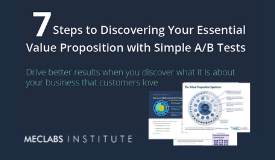Lead Nurturing: Market to personality and behavior, not job title
Originally published on B2B LeadBlog
In my most recent research project, the MarketingSherpa 2012 Executive Guide to Marketing Personnel, we identified key behavioral and motivational differences between marketing specialists. Much of what we learned applies beyond HR and can improve your lead nurturing and sales efforts.
The key to navigating your way to a sales-ready lead is navigating through individual personalities. When you apply the human touch, you must establish credibility and, essentially, establish and manage relationships with many different people at many different levels in an organization.
You must, as Brian Carroll put it, ripen some bananas …
“Fully 95% of your leads are like harvested green bananas, and, off the top, your sales team needs only the other 5%, those that are ripe…
“Lead nurturing is all about having consistent and meaningful dialog with viable prospects regardless of their timing to buy. It’s about building trusted relationships with the right people. In the end, it’s the act of maintaining mind share and building solid relationships with economic buyers. It’s not a salesperson calling up every few months to find out if a prospect is ‘ready to buy yet.'”
— Brian Carroll, Executive Director, Revenue Optimization, MECLABS
Lead nurturing based on personality
Below are some characteristics you will want to identify in your prospects as early as possible. They will improve your understanding of the people you’re contacting, and set a path for helping them “sell up” or move to the next stage in the buying process.
The person you are talking to in a lead’s organization might be:
| 1. | Your champion |
| 2. | Your influencer |
| 3. | Your decision maker |
As you communicate with each of these three levels, try to identify which of these characteristics are prominent in the person:
| 1. | How assertive and controlling is the person? | □ a little | □ at times | □ a lot |
| 2. | How strong of a communicator? | □ a little | □ at times | □ a lot |
| 3. | How process-oriented, methodical? | □ a little | □ at times | □ a lot |
| 4. | How analytical/detail-oriented? | □ a little | □ at times | □ a lot |
| 5. | How objective/task-oriented? | □ a little | □ at times | □ a lot |
| 6. | How subjective/free-flowing? | □ a little | □ at times | □ a lot |
| 7. | How individualistic? | □ a little | □ at times | □ a lot |
| 8. | How strong is his/her corporate attachment? | □ a little | □ at times | □ a lot |
Once you have communicated with your first contact or two, ask them about the decision maker so you can prepare them for the process of helping to achieve your mutual objective — putting Sales in touch with a decision maker ready to make a purchase.
Here’s an example of how to make this system work for you:
Scenario #1 — Wants to be a champion, but not very assertive
Let’s say your champion is not very assertive or a good communicator. He is much more detail- and process-oriented as well as very objective about his approaches. That means he will not be very subjective and will have an average or low individualistic profile.
Even if his corporate attachment is strong, he is going to need your help motivating the influencer. On your call, help him understand that you are there to support his efforts and achieve his goals so he can obtain what you are offering.
Work with him until he is comfortable with all the technical benefits of your product. Then ask if you could get on the phone with him and the influencer. Remember: You are his team member. Use phrases like “we,” “our,” and “us” a lot!
Scenario #2 — Is an assertive influencer but not convinced yet
Now, if your influencer is the exact opposite, then he will be less than excellent with details but an excellent relationship person. When you talk to him, focus on how this will help the individuals within the organization and make the department more efficient and effective.
Provide “global” concepts and images since he is more subjective in his thought processes. This is where your role becomes critical, because to influence a decision maker (who is obviously assertive and controlling), you must provide this “people person” with a compelling sales proposition. You must formulate that concept in his mind so it is the first thing out of his mouth when he meets with the decision maker.
Now, since we know the decision maker is assertive, let’s say he is also somewhat analytical and highly objective, only considering the bottom line. Then you must prepare the proposal or PowerPoint for the influencer with a “bottom-line” focus.
You want to help the influencer see that you want to help make him “look good” by identifying the key points most decision makers look for — “What’s it going to do for me today?” It can be as simple as an opening statement like, “How much effort does it take to add $100,000 to the company’s bottom line? ABC can do that with little to no long-term investment.”
However you set your approach, using this form can help you identify the key traits of the people you’re contacting. Instead of marketing to job titles, you can market to people and their personalities.
Related Resources:
Lead Nurturing: 9 questions answered on lead qualification, nurturing, and Marketing-Sales alignment
Lead Nurturing: 12 questions answered on content, tactics and strategy
Lead Nurturing: Build trust, win more deals by helping prospects — not selling them
Marketing Management: What is your company doing to increase knowledge and effectiveness?
Categories: Lead Generation B2B LeadBlog









